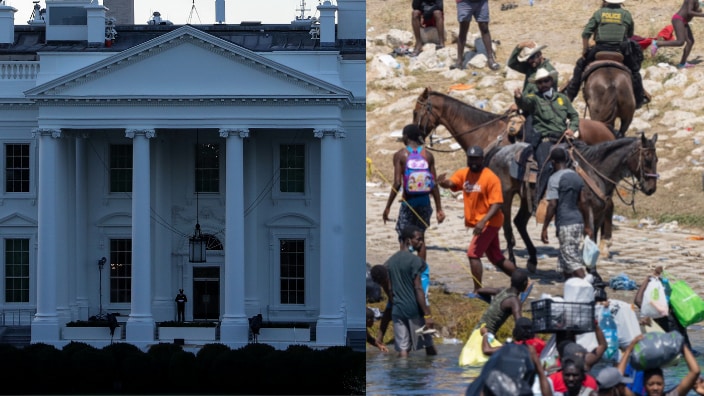White House to meet with CBC, civil rights leaders on Haitian border crisis
EXCLUSIVE: In addition to the meeting with Biden officials, Rev. Al Sharpton and a delegation is expected to visit the border in Texas to survey the treatment of Haitian migrants
The Congressional Black Caucus is headed to the White House to weigh in on the Haitian migrant crisis at the Texas border. Civil rights leaders are also expected to participate in the meeting, as the issue has become an all hands on deck situation, theGrio has learned.
(Photo: Getty Images)
The Black agenda has been on pause in Washington for months as lawmakers and activists have pushed, cried and been arrested in pursuit of federal action on pertinent issues for Black America like voting rights and police reform. But now, hands being laid on Haitian brothers and sisters of the African diaspora has struck a cord on a higher note of urgency.
NAACP President Derrick Johnson called for a meeting of the minds with President Biden on the deplorable Haitian migrant issue that is taking place in Del Rio, Texas. theGrio can confirm the request was received and Johnson plans to attend virtually from the west coast.
The legacy civil rights group went into overdrive after the pictures surfaced of the inhumane treatment of Haitian migrants by U.S. Border Patrol officers and their conditions in a makeshift tent city sheltering more than 14,000 Black migrants circulated.
Johnson, who has led the NAACP since 2017, demanded a meeting with President Joe Biden in a statement in which he took the new president to task over the Haitian migrant response.
“The humanitarian crisis happening under this administration on the southern border disgustingly mirrors some of the darkest moments in America’s history,” Johnson said. “If we were to close our eyes and this was occurring under the Trump administration, what would we do? The inhumane treatment of the Haitian refugees is utterly sickening.”
NAACP President Derrick Johnson addresses the Newsmaker Luncheon at the National Press Club August 29, 2017 in Washington, DC. (Photo by Chip Somodevilla/Getty Images)
However, the nation’s oldest civil rights group is focused on various components of this crisis at the U.S.-Mexico border. A prominent concern that will be part of the discussion is said to be options of patrolling without horses and whips, or horse bridles and reins used as whips with the intent to harshly lash immigrants.
Melanie Campbell of the Black Women’s Roundtable is not part of the expected presidential meeting, however, she has the ear of the president and told theGrio that “this cannot stand. We need answers.”
Maryland Congressman Kweisi Mfume, who sits on the Committee on Oversight and Government Reform as well as the Subcommittee on Civil Rights and Civil Liberties contends, “Working to prevent illegal immigration is difficult. But nothing excuses the hard truth that white men on horseback whipping Haitian refugees to exercise so-called crowd control harkens back to the rounding up of escaped slaves searching for a better life.”
U.S. Congressman Al Green of Houston is currently working on a resolution to condemn the border patrol’s handling of the crisis.
In a disturbing video shared by Al Jazeera Monday, a U.S. Border Patrol agent told Haitian migrants, “This is why your country’s s**t.” (Photo: Screenshot/Al Jazeera)
“I want to get the House to vote on it,” Green explained. “This is not a privileged resolution because it does not require anything but presentation of it. And in order to have to be voted on, we’ll have to have the opportunity to get it to the court by virtue of leadership agreeing that it should come to the table.”
Marc Morial of the National Urban League is also not part of the meeting but says this is an immigration issue and that Haitian migrants should be allowed “asylum” status.
Nana Gyamfi, executive director of the Black Alliance for Just Immigration, tells theGrio that Haitians have some of the strongest claims “as the country is too dangerous to go back.”
The Haitian government has told the U.S. not to send asylum seekers back as the country, which is still reeling from a recent deadly earthquake and instability following the assassination of its president this past summer, does not have the capacity to address an influx of people. Additionally, the U.S. is sending Haitians, some of whom have been rejected from Latin American nations that they have settled in after the 2010 earthquake, back to a country they no longer know after more than a decade of transitions and political turmoil.
Rev. Al Sharpton of National Action Network is looking for the White House to outline how it defines asylum and what will happen to the border patrol officers who were photographed assaulting Haitians. The famed reverend is expected to travel to the border with a delegation this week to seek answers and advocate for the migrants.
(Photo by Chip Somodevilla/Getty Images)
Another question is the difference between the asylum and refugee process that is making this issue more complicated — asylum seekers choose the country they want to seek refuge in while refugees apply through the United Nations for an assigned new country to resettle in.
To apply for asylum, the applicant must be in the country they are applying for when the request is made, unlike the refugee process. Sending Haitians back is inadvertently stripping them of their ability to file for asylum.
“That is actually a violation,” said Gyamfi of Black Alliance for Just Immigration. “What has been done is unlawful under U.N. and U.S. policies. Asylum seekers have to be here instead of just being shipped off in plain sight.”
Have you subscribed to theGrio’s “Dear Culture” podcast? Download our newest episodes now!
TheGrio is now on Apple TV, Amazon Fire and Roku. Download theGrio.com today!
The post White House to meet with CBC, civil rights leaders on Haitian border crisis appeared first on TheGrio.

